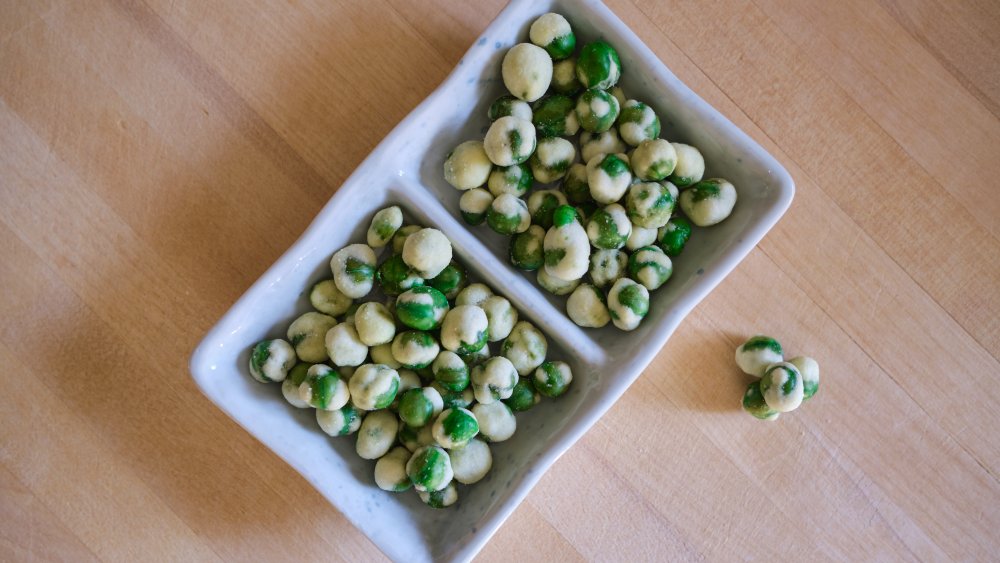Do you want a kick with your crunch? Wasabi peas may be your response. These little green fallen angels are springing up all over, enticing taste buds with their red hot flavor. But are they a good snack option or just a delicious way to ruin your diet? We should plunge into the universe of wasabi peas and check whether they merit a spot in your storage room. So, Lets Began Are Wasabi Peas Healthy Snack or Not.
Also Read: Are Quest Protein Chips Healthy Snack or Not [ True Review ].
The Good Side : Why Wasabi Peas Can Be a Healthy Choice
There’s more to wasabi peas than just heat. Here’s what makes them a possibly healthy snack:
- Protein Powerhouse: Peas are a characteristic source of plant-based protein, which keeps you feeling fuller for longer and assists with muscle development and fix. A one-ounce serving of wasabi peas can pack around 4-5 grams of protein, a respectable sum for a bite.
- Fiber Fiesta: Peas are likewise a decent source of fiber, which helps processing, advances feelings of totality, and could assist with bringing down cholesterol levels. Fiber is a companion for weight the board and generally stomach happiness.
- Nutrient Nook: Wasabi peas don’t just have no nutritional value. They contain essential vitamins and minerals like manganese, which is important for brain function and metabolism, and iron, which helps transport oxygen throughout your body.
- Glucose Backing: The protein and fiber combo in wasabi peas can assist with directing glucose levels. Protein assists with insulin awareness, and fiber dials back sugar retention, prevention those feared energy crashes.
- Spice Up Your Life (Maybe a Little Too Much): Although wasabi is frequently used economically in these snacks, it may have some positive effects on health. It has isothiocyanates in it, which have been shown to lower inflammation and even fight cancer cells. But more research is needed to confirm these effects from wasabi peas specifically.
The Not-So-Good Stuff: Why Wasabi Peas Might Not Be Perfect
While wasabi peas have their facts, there are some disadvantages to consider:
- Sodium Over-burden: One of the greatest worries with wasabi peas is their high sodium content. A solitary serving can undoubtedly contain 100mg or a greater amount of sodium, which can add to hypertension and other medical issues whenever consumed unnecessarily.
- Secret Sugars: Be careful about added sugars in certain brands of wasabi peas. These can cause you to crave sugar and add extra calories. Continuously check the fixings list prior to purchasing.
- Segment Control Challenge: Wasabi peas are habit-forming! Their little size and serious flavor can make it simple to chomp through an entire sack carelessly. To avoid consuming an excessive amount of sodium, calories, and possibly added sugar, be mindful of portion sizes.
- The “Wasabi” Question: A fun fact to know is that the majority of wasabi peas on the market do not actually contain real wasabi! Horseradish, mustard, or green food coloring typically contribute to the color and fiery kick. While these options can be delicious, they come up short on potential medical advantages of genuine wasabi.
Wasabi Peas: Friend or Foe?
The decision? Wasabi peas can be a healthy snack option, but with some important warnings. Here’s how to make them work for you:
- Portion Control: To avoid consuming an excessive amount of sodium, calories, and possibly added sugar, limit each serving to one ounce.
- Brand Exploring: Pick brands with lower sodium content and no additional sugars.
- Match it Up: Appreciate wasabi peas with other sound tidbits like nuts, natural products, or yogurt for a more adjusted and filling choice.
- Stand by listening to Your Body: Focus on how your body responds to wasabi peas. Limiting your intake may be in your best interest if you experience heartburn or swelling.
FAQs: Wasabi Pea Wisdom
Q: Are wasabi peas keto-friendly?
A: It depends. While the protein and fat content can be keto-friendly, the high sodium content might not be ideal. Check the specific carb count of your chosen brand.
Q: Can I eat wasabi peas every day?
A: In moderation, sure. Just be mindful of the sodium content and balance them out with other healthy snacks throughout the week.
Q: Are there any health benefits to the wasabi flavoring?
A: The jury’s still out. While wasabi itself might have some health benefits, the amount you get from wasabi peas is likely minimal.
The Final Crunch
Wasabi peas can be a delectable and fulfilling taste when delighted in carefully. By holding segment sizes under tight restraints and picking brands with lower sodium and no additional sugar, you can transform these red hot fellas into a sound eating partner. Thus, get a little bowl, relish the flavor, and participate in your wasabi peas good!
Are wasabi peas better than chips?
Generally yes, wasabi peas tend to be lower in fat and calories than potato chips. However, it depends on the specific chips and wasabi peas you compare.
How many calories are in wasabi coated peas?
Calorie count can vary depending on the brand, but a one-ounce serving typically contains around 100-150 calories.
Are wasabi peas fried or baked?
Both methods are possible. Some brands fry, while others bake their wasabi peas.
Do wasabi peas have real wasabi?
Most commercially available wasabi peas do not contain real wasabi due to its high cost. The green color and spice come from substitutes like horseradish, mustard, and food coloring.
